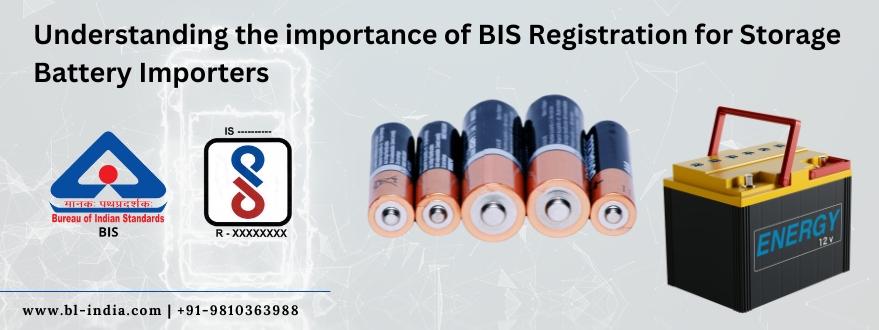
Yes, Importers of storage batteries are required to obtain BIS Registration to ensure that the imported products meet the specified standards and quality requirements set by the BIS (Bureau of Indian Standards). The BIS standards for storage batteries include parameters related to performance, safety and other relevant characteristics. BIS certification ensures that the products meet the specified standards, ensuring quality, safety and reliability.
In this blog, we will understand the necessity of BIS Registration for importing storage batteries in India.
A storage battery is an electrical battery designed for repeated charging and discharging cycles. Unlike single-use batteries, which are discarded after depletion, storage batteries are rechargeable, allowing them to be used in various applications such as electric vehicles, renewable energy storage systems, uninterruptible power supplies (UPS) and portable electronic devices like smartphones and laptops. These batteries come in various chemical compositions, including lead-acid, lithium-ion, nickel-cadmium and nickel-metal hydride. The primary function of a storage battery is to store electrical energy during periods of low demand and release it when needed. This flexibility makes them crucial for applications where a continuous power supply is not readily available. With various voltage and capacity options, storage batteries contribute to efficient power management, supporting the growing demands of modern technology and sustainable energy solutions.
BIS (Bureau of Indian Standards) is a national standards body responsible for developing and maintaining quality standards for diverse products and services. BIS Registration is a mandatory certification process in India ensuring that products meet specified quality and safety standards. It is particularly crucial for products related to health, safety and environmental considerations.
Covering a wide range of products, BIS Certification signifies adherence to Indian standards and is crucial for manufacturers and importers to legally sell or distribute their products in the Indian market. The certification is granted upon successful evaluation and the BIS mark is affixed on compliant products. BIS certification is crucial for market access, fostering consumer confidence and preventing the circulation of substandard products.
BIS Registration holds significant importance for storage battery importers due to several key reasons. Firstly, BIS certification ensures that storage batteries comply with the established quality and safety standards set by the Bureau of Indian Standards (BIS). This is crucial for consumer safety and satisfaction, as certified batteries are more likely to meet performance expectations and adhere to specified technical requirements.
Secondly, BIS Registration is a legal requirement for many products, including storage batteries, under Indian regulations. Importers must obtain this certification before introducing their products to the Indian market. Failure to comply with BIS standards can result in legal consequences, including penalties and restrictions on product distribution.
Moreover, BIS Registration enhances the credibility and trustworthiness of storage battery importers in the market. Consumers, retailers and other stakeholders often prioritize products with BIS certification, viewing it as a mark of quality and reliability. This certification can thus contribute to a positive brand image and increased market acceptance.
Additionally, BIS standards aim to ensure the efficiency and environmental sustainability of products. For storage batteries, compliance with these standards helps in promoting energy-efficient and eco-friendly technologies, aligning with global trends toward sustainable practices.
The BIS certification for storage batteries comprises four integral components including the product, manufacturer, trademark and manufacturing address. Let's delve into these components in detail.
The applicable Indian standard for storage batteries is IS 16270:2014. This standard, published by the Bureau of Indian Standards (BIS), outlines the specifications for storage batteries. This standard covers various aspects related to the design, construction, performance, testing and labelling of storage batteries. It aims to ensure the quality and safety of these batteries used in a variety of applications, including automotive, industrial and standby power systems.
The process for BIS Registration differs between domestic (Indian) manufacturers and foreign manufacturers.
A) Procedure for Domestic Manufacturer
STEP 1: Provide the online submission of the application.
STEP 2: Conduct sample testing through a BIS-approved laboratory.
STEP 3: Submit the application's hard copy, including the sample test report and application fees, through online or offline channels.
STEP 4: BIS officials conduct a comprehensive evaluation of the application.
STEP 5: Once the application review is successful, the License is conferred.
B) Procedure for Foreign Manufacturer
STEP 1: Appoint an Indian Representative authorized to act on behalf of the foreign manufacturer.
STEP 2: Complete the online submission.
STEP 3: Arrange for the testing of samples at a BIS-approved laboratory.
STEP 4: Submit a hard copy of the application, along with the sample test report and application fees, through online or offline means.
STEP 5: The BIS Officials meticulously examine the submitted application.
STEP 6: The License is duly granted upon successful completion of the preceding steps.
The list of documents required for BIS CRS Registration is as follows:
Obtaining BIS certification for your storage batteries not only facilitates growth in global markets but also guarantees adherence to quality and safety standards for your products.
Brand Liaison is a BIS Certification consultant in India that offers prompt support to manufacturers, importers or traders requiring assistance with BIS certification for storage batteries or any other product. Our guidance assists manufacturers in making well-informed decisions throughout the BIS certification process.